UofM Magazine

Ascending in Research
The University of Memphis Research in a Minute series spotlights some of the most active and accomplished researchers across various disciplines at the UofM. As an R1 university according to the Carnegie Classification of Institutions of Higher Education, the UofM is proudly among the top tier of research universities nationally. This status, first achieved in 2021, has helped solidify the UofM as one of two flagship public research institutions in Tennessee. Research in a Minute provides a glimpse into the work of dedicated researchers who have helped the UofM achieve and maintain top-tier research status.
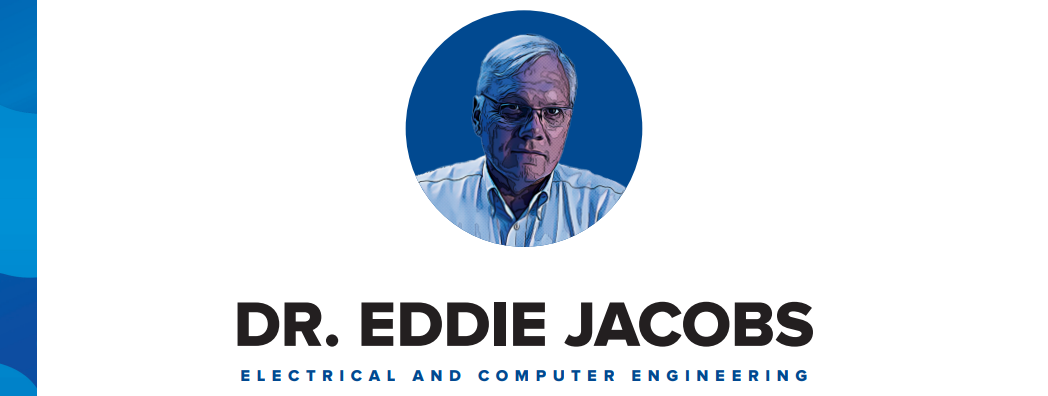
Dr. Eddie Jacobs: Electrical and Computer Engineering
Dr. Eddie Jacobs’ research involves the use of drones and sensors working together to collect information over a large area, which can be applied to assist in precision agriculture, environmental assessments, military applications and more.
Jacobs is a professor of Electrical and Computer Engineering in the Herff College of Engineering and a senior researcher for Drones and Advanced Sensors with the UofM’s Center for Applied Earth Science and Engineering Research. He has more than 20 years of combined experience in the modeling, analysis and development of military sensing systems across private industry, government and academic perspectives.
In 2021, a group of researchers led by Jacobs secured a $2.7 million grant from the U.S. Combat Capabilities Development Command Army Research Laboratory to develop unmanned aerial systems, or drones, to detect and identify potential threats and items of interest across a specific area. The project involves sensors, communication between multiple drones, artificial intelligence and machine learning.
“If a drone sees something of interest, an interrogator drone can go take a look,” Jacobs said. “Then, it may also be advantageous to have a third drone come and look at it. Now, you’ve gained a potentially significant amount of information about an area through strictly unmanned systems.”
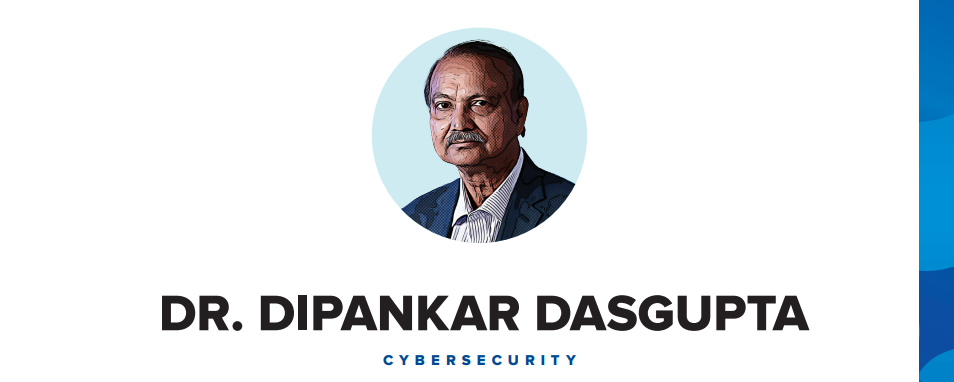
Dr. Dipankar Dasgupta: Cybersecurity
Dr. Dipankar Dasgupta’s research focuses on using artificial intelligence machine learning techniques in cybersecurity. He is a professor in the Department of Computer Science and the director of the Center for Information Assurance (CfIA), which he founded at the UofM in 2004.
The research conducted and concepts developed through the CfIA are used to educate, inform and produce training materials on cybersecurity for various agencies, including the U.S. Department of Homeland Security and the Federal Emergency Management Agency. The work led by Dasgupta through the CfIA makes the UofM one of the leading universities in the country in regard to transforming cybersecurity research into an educational tool.
As new technology continues to emerge, cybersecurity becomes increasingly critical for safety, security and privacy.
“Students are greatly benefiting from pursuing the emerging area of cybersecurity, where there are a significant number of job opportunities with high salaries,” Dasgupta said. “These jobs come to them because there is a critical need across many industries, whether it be in education, government, healthcare, manufacturing, energy, utilities, legal or criminal justice. The global market for trained individuals in cybersecurity is projected to increase by 35% between 2021-31, according to the U.S. Bureau of Labor Statistics. The University of Memphis’ computer science department provides a great opportunity to pursue this booming industry where available jobs outnumber qualified candidates.”
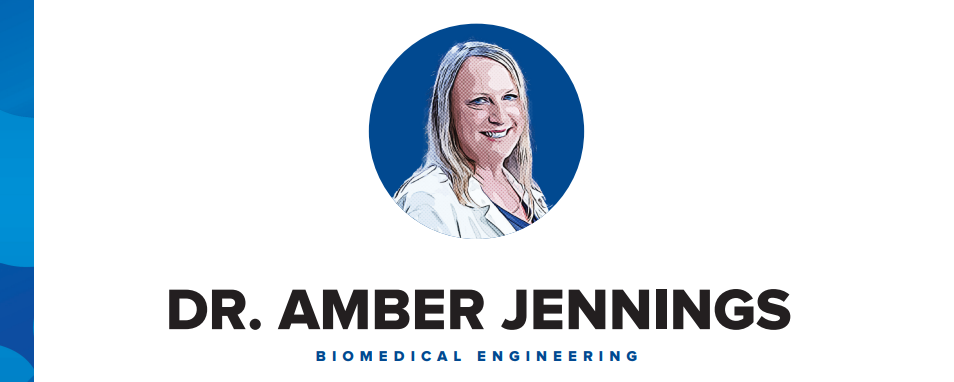
Dr. Amber Jennings: Biomedical Engineering
Dr. Amber Jennings’ research is focused on biomaterials for infection prevention. The Jennings lab at the UofM uses natural biomaterials, such as shrimp shells, to create wound bandages or injectable pastes to prevent traumatic injuries from leading to infection and further complications.
“We can use sponges that soak up a therapeutic biomaterial and deliver it to the tissue or even create an injectable material to serve the same purpose,” Jennings said. “The goal is to translate this into a product and commercialize it at some point in the near future.”
Jennings studied Biomedical Sciences at the University of Alabama, followed by graduate studies in Biomedical Engineering at the University of Alabama at Birmingham. She began her graduate studies researching the effects of direct current electrical fields on cells involved in the wound healing response. In her postdoctoral work, she investigated local drug delivery systems for preventing infection.
Jennings has co-edited a two-volume series of books on chitosan-based biomaterials and has co-authored six book chapters, 50-plus peer-reviewed journal articles, five commentaries and more than 150 conference presentations. She has mentored more than 30 undergraduate students, with several winning honors and advancing to professional schools, graduate school or industry positions.
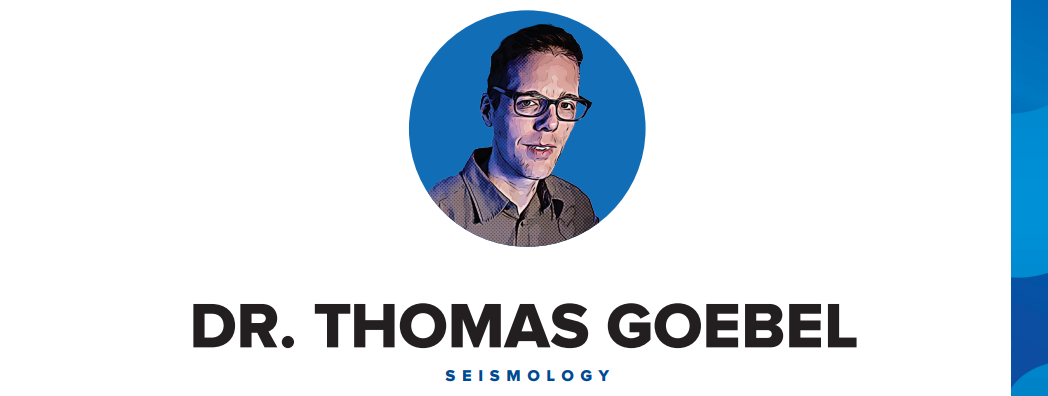
Dr. Thomas Goebel: Seismology
Dr. Thomas Goebel’s research is focused on the analysis of induced seismicity, fault structure and earthquake source processes. An assistant professor in seismology at the Center for Earthquake Research and Information, Goebel aims to improve the documentation of fault hydrology and crustal stresses using laboratory experiments, analytical and numerical models and statistical analyses.
At a larger scale, he is interested in what controls earthquake behavior and interaction. The significance of this work, particularly lab experiments, helps us understand the difference between earthquakes — foreshocks, mainshocks and aftershocks. The goal is to better predict and prepare for earthquakes.
“We connect our observations from the natural system to laboratory scale experiments to explore the underlying physics and try to understand the overall earthquake frequency in an area,” Goebel said. “This informs how we should adjust our infrastructure and building codes. All of this requires a more in-depth physical understanding of the underlying processes.”
In addition to scientific research, Goebel’s current and former roles include science communication and outreach through news outlets, scientific articles and conference presentations. His work is further enriched through teaching programming and data analysis classes to undergraduate and graduate students as well as through advising and mentoring.
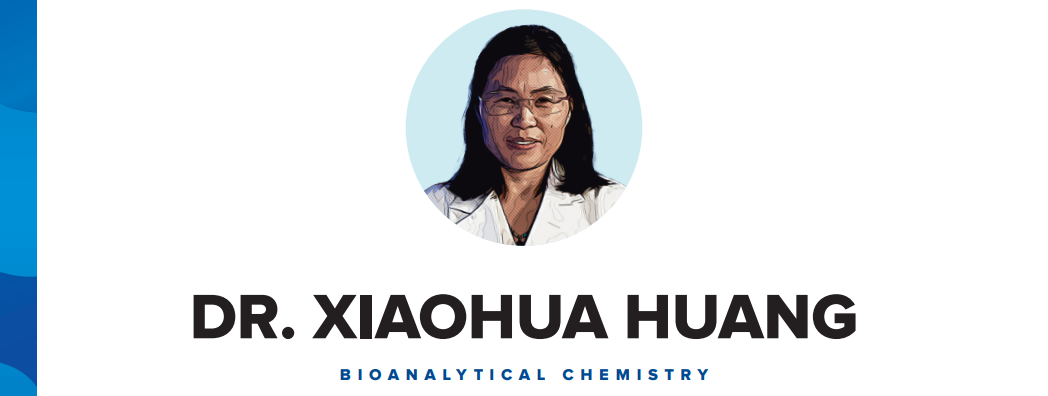
Dr. Xiaohua Huang: Bioanalytical Chemistry
Dr. Xiaohua Huang's research focuses on the development of advanced nanomaterials and related technologies for cancer detection and laser treatment, particularly blood-based early cancer detection and metastasis prediction.
“Obviously, cancer is such a major health problem, so this is very important research,” said Huang. “If we don’t catch it early, it becomes increasingly difficult to treat, and metastasis causes more than 90% of cancer deaths. After treatment, patients always have that worry that the cancer will come back. So, in addition to helping with early detection, we are working to predict the chances it will come back and improve overall outcomes.”
Huang has published more than 60 peer-reviewed journal articles with over 35,000 citations. She has received several honors, including the Dunavant Professorship and the Early Career and Research Award from the UofM College of Arts & Sciences; the Women in Cancer Research Brigid G. Leventhal Scholar from the American Association for Cancer Research; and the Ralph E. Powe Junior Faculty Enhancement Award from the Oak Ridge Associated Universities.
Huang earned a PhD in Analytical Chemistry from Georgia Tech in 2006. After postdoctoral training at Georgia Tech and Emory University, she joined the UofM as an assistant professor in 2010, becoming tenured and promoted to associate professor in 2016 and to full professor in 2021.
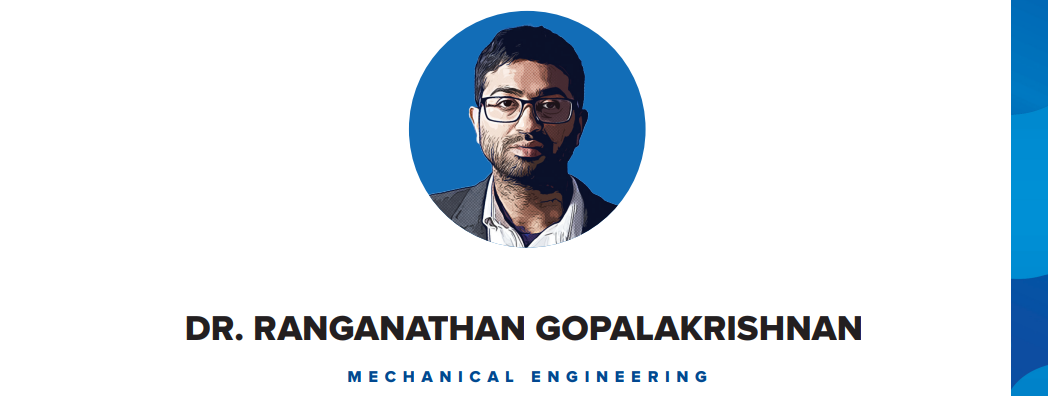
Dr. Ranganathan Gopalakrishnan: Mechanical Engineering
Dr. Ranganathan Gopalakrishnan’s research is focused on dust particle behavior in plasmas with an overarching goal of contributing to the realization of nuclear fusion to produce limitless clean energy. In a broad sense, his research is aimed at understanding how particles behave in diverse systems of interest in science and technology.
A UofM faculty member since 2016, Gopalakrishnan is an associate professor and the Graduate Program Coordinator in the Department of Mechanical Engineering. He received his PhD from the University of Minnesota in 2013 after earning a Bachelor of Technology in Mechanical Engineering from the National Institute of Technology in Tiruchirappalli, India, in 2008.
The work of Gopalakrishnan and his team at the UofM primarily involves analyzing problems related to aerosols, plasmas and ionized gases. Notably, they have developed and patented a highly efficient powder dispersion method that uses ultrasonic waves to disperse dry powders as aerosols.
“We use both experimental and modeling techniques to understand how particles behave from the molecular scale to the micron scale to the millimeter scale,” Gopalakrishnan said. “What makes this interesting is at every scale the type and the strength of the forces that act between particles keeps changing. That’s what makes the research fascinating, but also challenging.”
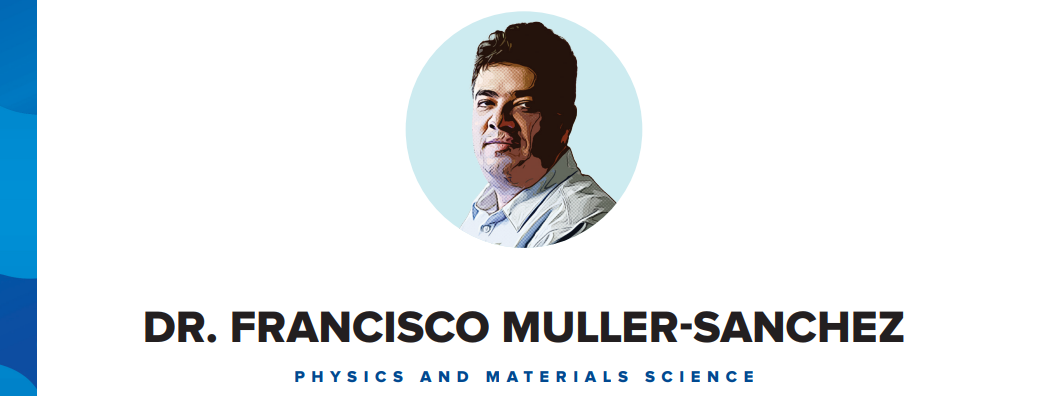
Dr. Francisco Muller-Sanchez: Physics and Materials Science
Dr. Francisco Muller-Sanchez’s research focuses on the regions around supermassive black holes in order to observe how they are fueled and influence their host galaxies.
“It is our current understanding that all galaxies in the Universe have a supermassive black hole at the center,” said Muller-Sanchez. “Our research goal is to characterize the environments around these supermassive black holes to understand and discover the physical processes that drive the evolution of galaxies.”
Muller-Sanchez joined the UofM's Department of Physics and Materials Science in 2018 to help expand the astrophysics program. Through the introduction of new astronomy and astrophysics courses, the University implemented an astronomy concentration in 2019.
In January 2023, Muller-Sanchez and a team of scientists discovered a pair of supermassive black holes growing simultaneously near the center of the newly coalescing galaxy. These “dining” giants are the closest together black holes scientists have ever observed in multiple wavelengths. The discovery revealed that binary black holes and the galaxy mergers that create them may be surprisingly commonplace in the Universe. The results of the research were published in The Astrophysical Journal Letters and presented in a press conference at the 241st meeting of the American Astronomical Society in Seattle, Wash.
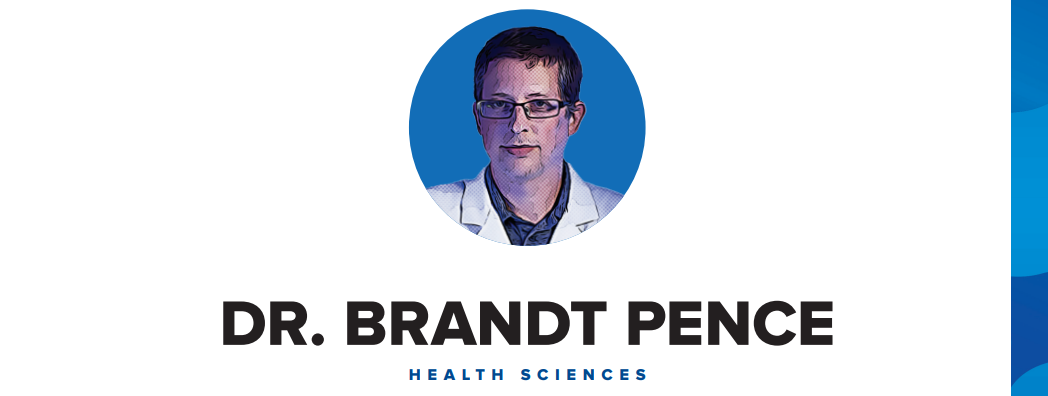
Dr. Brandt Pence: Health Sciences
Dr. Brandt Pence’s Research focuses on how metabolism impacts the immune system in aging and age-related diseases.
Pence, an associate professor of Health Sciences, is currently working on a project funded by the National Institutes of Health to determine if a particular dysfunction in the mitochondria causes impaired immune responses during aging, and if healthy mitochondria can be transplanted to improve immune function. He is also working on an American Heart Association-funded project aimed at defining mitochondria-targeted treatments for atherosclerosis, the most common type of cardiovascular disease. His ongoing research includes examining the impact of exercise on immune function, as well as the impact of various metabolites and metabolic inhibitors on inflammation.
Pence earned his PhD in exercise physiology at the University of Illinois Urbana-Champaign before completing postdoctoral studies in nutrition at the same institution. His main field of focus is immunophysiology. He focuses on identifying how physiological stressors, such as diet and exercise, impact immune function. He is especially interested in inflammatory processes, such as wound healing, and how they can be regulated by metabolic changes in immune cells. In 2021, Pence was awarded a University Research Professorship.
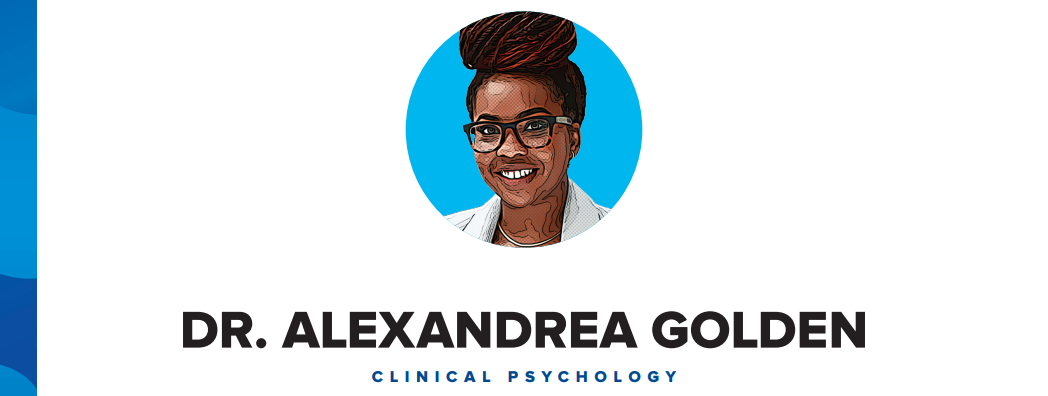
Dr. Alexandrea Golden: Clinical Psychology
Dr. Alexandrea Golden’s research focuses on sociocultural factors that promote positive development and resilience among racially minoritized youth exposed to racism. Her research areas include school racial climate, racial socialization, critical consciousness and more.
With many publications to her credit, Golden depends on qualitative and quantitative research, as well as a collaborative work culture, to move her work forward.
“I really focus on sociocultural factors that I can encourage or promote that will help youth who experience racism do well with various outcomes such as their academic functioning and mental health,” Golden said. “Racially minoritized youth experience up to five discriminatory events a day, which is obviously a lot. The repercussions of this are both immediate and far-reaching in their lives. How successful youth can be throughout their lives is directly impacted by their experiences of discrimination now.
“It’s really important that in addition to examining the ways we can change systems to improve these youth experiences that we also identify protective factors since we know that system change is very slow.”
Golden has a bachelor’s degree in Psychology from Spelman College, a Master of Arts in Counseling for Mental Health and Wellness from New York University and a doctorate in Clinical-Community Psychology from the University of South Carolina.
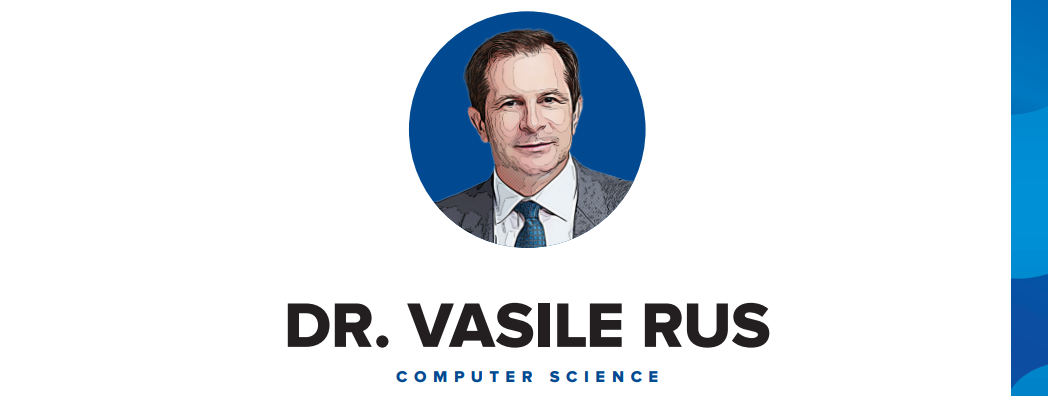
Dr. Vasile Rus: Computer Science
Dr. Vasile Rus’ research focuses on transforming the learning ecosystem through the use of artificial intelligence, machine learning and data science to better understand how students learn. The overall goal is to improve learning environments that use technologies such as intelligent learning systems.
“We work to make the learning ecosystem more effective, efficient, engaging, equitable and affordable,” Rus said. “We have numerous projects, many of them around developing advanced learning technologies while targeting STEM areas such as physics, computer science and data science.”
The Jack and Jane Morris Professor of Computer Science and a researcher in the UofM’s Institute for Intelligent Systems, Rus has published more than 80 scientific articles in premier peer-reviewed international conferences and journals, as well as book chapters. He has received several best paper awards at international conferences, and all of his PhD students have earned research awards for their work under his guidance. He has also mentored students who have received summer internships at prestigious research labs such as the Stanford Research Institute, AT&T Research Labs, Vulcan and IBM.
Rus has received research awards to support his work from the National Science Foundation, Institute for Education Sciences, Office of Naval Research and other federal agencies. He has been a principal investigator or co-principal investigator on awards totaling more than $6.2 million.
Share this article
